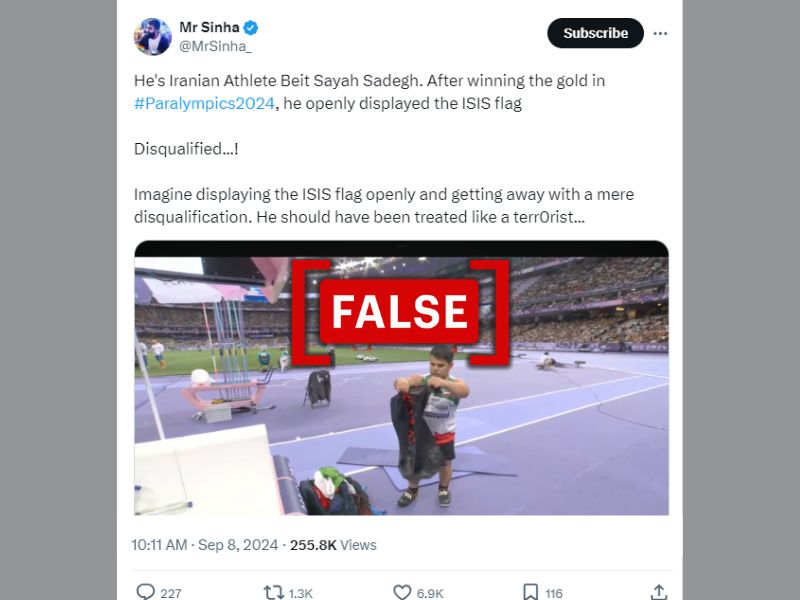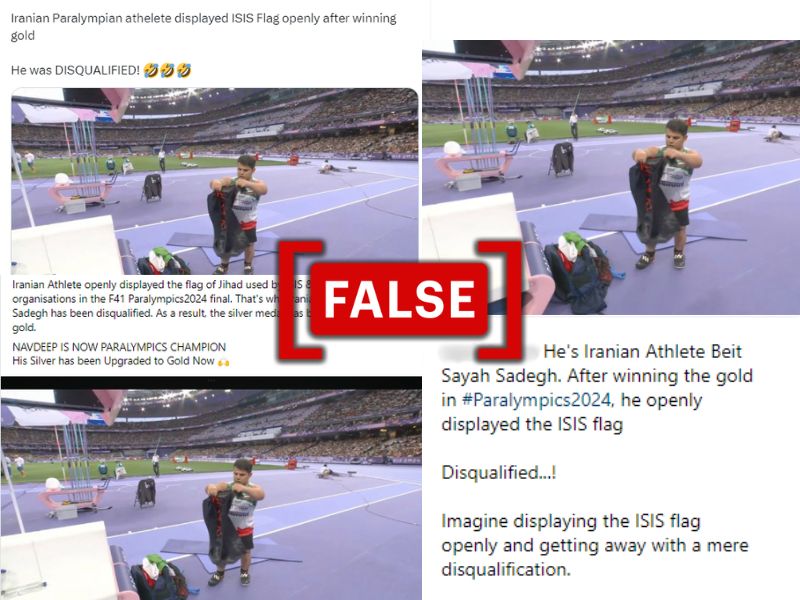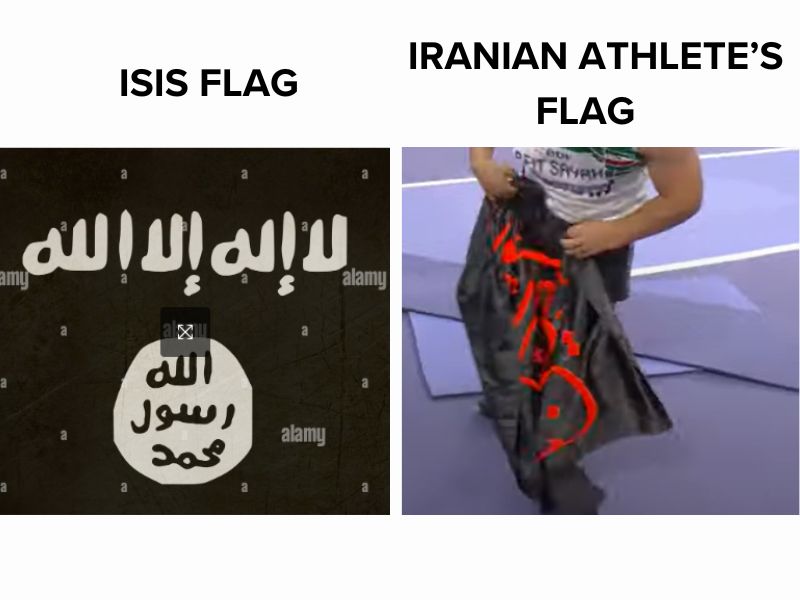By: Ankita Kulkarni
September 11 2024
 Social media users have incorrectly claimed that Iranian athlete Sadegh Beit Sayah displayed the ISIS flag at 2024 Paris Paralympics. (Source: X/Screenshot/Modified by Logically Facts)
Social media users have incorrectly claimed that Iranian athlete Sadegh Beit Sayah displayed the ISIS flag at 2024 Paris Paralympics. (Source: X/Screenshot/Modified by Logically Facts)
The black flag with red Arabic text held by the Iranian athlete at the 2024 Paris Paralympics is a religious flag, not an ISIS banner.
What is the claim?
An image of Iranian athlete Sadegh Beit Sayah holding a black flag with red text is circulating on social media, claiming he displayed the "ISIS flag" after winning the gold in the men's javelin throw (F41 category) at the 2024 Paris Paralympics. Islamic State (ISIS) is an extremist armed group involved in multiple global terrorist attacks.
One such post (archived here) shared on X (formerly Twitter) by the account "Mr Sinha," known for spreading misinformation, stated: "He's Iranian athlete Beit Sayah Sadegh. After winning gold in #Paralympics2024, he openly displayed the ISIS flag. Disqualified...! Imagine displaying the ISIS flag openly and getting away with a mere disqualification. He should have been treated like a terrorist." The post had received 255,800 views and 6,900 likes at the time of this fact-check.
Similar claims have also been shared across Instagram and Facebook, with archived versions available here and here.
 Screenshot of viral posts circulating on social media. (Source: X/Screenshot/Modified by Logically Facts)
Screenshot of viral posts circulating on social media. (Source: X/Screenshot/Modified by Logically Facts)
However, Logically Facts found that the flag displayed by the athlete at the event is a religious flag and not of ISIS.
What did we find?
We reviewed the men's javelin throw finals, live-streamed on the official YouTube channel (archived here) of the 2024 Paris Paralympics. At the 47:39 mark, the athlete is seen taking a black flag with red Arabic text from his backpack, as seen in the viral image. However, you can only see the athlete adjusting the flag to display. After that, footage cuts and shows other members of his committee waving Iran's national flag.
A closer look at the flag in the video shows it does not resemble the ISIS flag. While both flags have black backgrounds, the ISIS flag features white text, which can be viewed here and here, whereas the flag that was held has red text.
 An image showing a comparison between the ISIS flag and the one that was held.
An image showing a comparison between the ISIS flag and the one that was held.
(Source: YouTube/Alamy/ Screenshot)
Further research led us to a blog post uploaded on the website Hazrat Masuma's Sacred Sanctuary, which included an image of the flag that matched the one held by the athlete.
The red Arabic text on the flag reads, "Umm ul-Banin." The blog detailed that Hazrat Umm ul-Banin was the wife of Imam Ali ibn Abi Talib, one of Islam's first prophets. A similar flag can also be observed here, confirming that it's a religious flag representing Umm ul-Banin, a religious figure, and not ISIS.

Comparison of the flag held and Umm ul-Banin. (Source: YouTube/ Hazrat Masuma's Sacred Sanctuary)
Why was the athlete disqualified?
The 2024 Paris Paralympics, held from August 28 to September 8, saw Iranian athlete Sadegh Beit Sayah compete in the men's javelin throw (F41 category for athletes of short stature). He won a gold medal with a throw of 47.64m but was later disqualified for "unsporting or improper conduct," according to the official website.
Hindustan Times reported that although the Paralympics committee did not specify the reason for the disqualification it was speculated to be due to his display of a religious flag. As a result, India's Navdeep Singh was awarded the gold medal.
The verdict
The evidence clearly establishes that Iranian athlete Sadegh Beit Sayah was seen displaying a religious flag and not an ISIS flag, as claimed in the post.